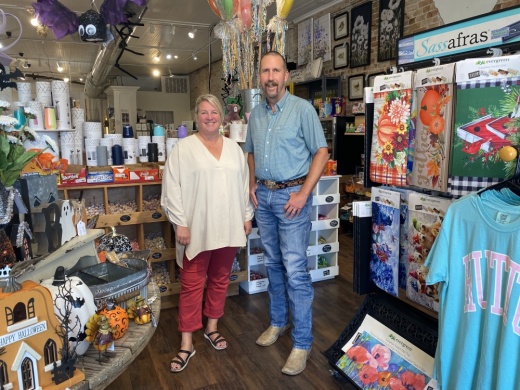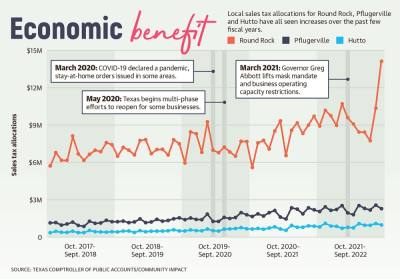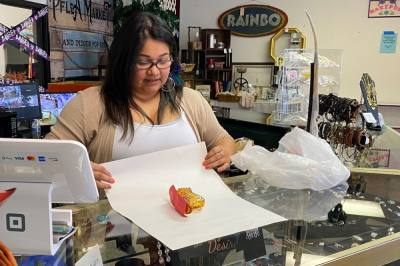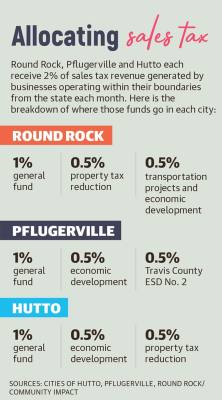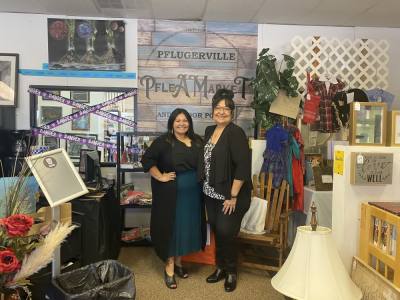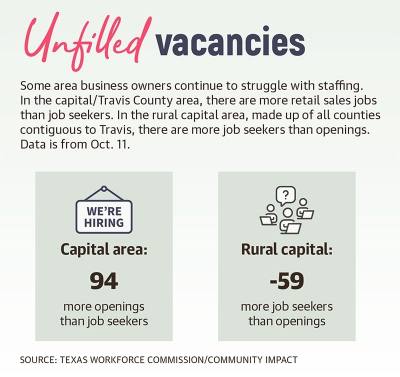“The second round of COVID-19 hit, and we were just dead,” Thomas said. “No business whatsoever. We stayed that way through the end of the year. I had to make a hard business decision, because I was losing too much money.”
As the Round Rock, Pflugerville and Hutto communities are experiencing gains in local sales tax allocations from the state, some locally owned businesses are still struggling with supply chain and staffing issues a year after they began.
Texas Comptroller of Public Accounts data shows each city experienced gains in local sales and use tax over the past four fiscal years, indicating a strong local economy, according to city officials. In Round Rock and Hutto in particular, the increase in allocations year over year from 2021 to 2022 at the end of the fiscal year in September is nearly 20%, well ahead of prepandemic highs.
“It is easy to order something online or on Amazon,” said Jordan Robinson, president and CEO of the Round Rock Chamber. “But local businesses really do rely on the uptick in sales over the holiday season. [I would] encourage people to shop local and support the local economy, and that will go a long way.”
Ongoing challenges
In 2021, local businesses said struggles with staffing and supply chain issues were driven by the COVID-19 pandemic, as previously reported by Community Impact. Nearly a year later, some owners say those same problems persist.
“The holiday shopping season might actually start sooner than it formerly has,” Robinson said. “The supply chain issues are not solved by any means, but it seems to be moving in a direction that is improving.”
Matt Widmer and Kim Kubula, owners of the Hutto General Store, a business formerly known as Creative Touch, said they experienced supply chain issues in 2021, but are expecting improved product availability this year.
“I think we’re finally starting to get merchandise in,” Kubula said. “The last two years, because you order for Christmas and fall in January, we didn’t even get half of what we ordered. This year merchandise is coming in so there’ll be more to actually offer customers.”
Some owners of local resale businesses, such as Uptown Cheapskate in Round Rock and the Pflugerville Pflea Market, say they have not experienced supply chain issues that have plagued other businesses. Thomas attributed this to the way vendors source their products.
“As far as supply goes, I haven’t really encountered that our vendors are running into that,” Thomas said. “I think that if they are, they’re just bypassing it with different options.”
In Round Rock, Uptown Cheapskate owner Christina Latterell-Loganimoce said supply chain issues have had a small impact on operations at the resale store, which was damaged in the March 2022 tornado. The store was closed for several months as floor-to-ceiling glass windows were replaced and other damage was remediated.
“We have roughly 10%, maybe 15% of new product in store,” Latterell-Loganimoce said. “The cost of new product is increasing. The cost of freight shipping is through the roof. But with the used product that we’re buying in, our inventory levels seem to be pretty steady and stable.”
Staffing issues felt by business owners are top of mind, she said, especially during the holiday season. Some job applicants fail to show up for interviews or the first day of work.
“We’re looking for people who are wanting to learn and [have] customer service [skills],” Latterell-Loganimoce said. “It’s really hard to train customer service into somebody, looking at the customer’s whole experience, not just the one piece that they’re impacting.”
Sally Mascorro, who owns Pflugerville-based home decor store SM Boutique-Mexican Imports, said she closed her storefront in Taylor before the onset of COVID-19 in the U.S. and continued offering items for sale through a Facebook page. She opened her Pflugerville store in May and said she has not experienced issues with supply chain delays because the majority of her merchandise is self-sourced.
“What works well for us is that we personally go get the product,” Mascorro said. “We actually rent some trailers and head over to get all the product that we need. That kind of helps us with supply issues, because if something is not there that I was thinking of carrying for Q3 and Q4, then I will be there to choose something different and get a bunch of that.”
Shopping local
Buying from local businesses can help boost the local economy due to the way sales and use taxes are assigned, Round Rock Chief Financial Officer Susan Morgan said. Sales and use taxes generated by sales in the cities of Round Rock, Pflugerville and Hutto contribute to city revenues. Two percent of total sales tax stays with the city versus going to the location of an online seller.
In particular, sales tax accounts for 45% of the city of Round Rock’s general fund budget for the 2022-23 fiscal year. The city has been able to pay for projects such as Brushy Creek Regional Utility Authority water line replacements with cash from its self-financed construction fund, which is primarily funded with sales tax revenue.
“Sales tax is a lovely balance for us,” Morgan said during budget discussions. “That gives us a lower tax rate [and] better amenities for that, but it is also a very volatile source from an economic standpoint, as we discovered last year, and from a regulatory standpoint. We want to make sure we don’t over-rely on that.”
In Round Rock, the 8.25% sales tax rate can be broken down into the 6.25% base rate paid to the state, with 1% designated to city revenue, 0.5% to reduce the city’s property tax rate and 0.5% going toward city transportation projects and economic development.
The city of Pflugerville sets aside 1% of every taxable dollar spent in the city for its own revenue, with 0.5% intended for economic development and the remaining 0.5% dedicated to Travis County ESD No. 2. Similarly, Hutto also allocates 1% to city revenue, with 0.5% for economic development and 0.5% to reduce the city’s property tax rate.
One effort is underway to encourage residents to shop locally. The Shop Small Society comprising business owners in Williamson and Bell counties launched a holiday shopping passport from Nov. 1-Dec. 11. Shoppers can visit participating businesses to collect stamps for their passport and be entered to win prizes.
Choosing to shop local also benefits those businesses directly, as many may rely on the holiday shopping season to stay afloat, Robinson said.
“Probably more than 90% of our membership base is small businesses,” Robinson said. “A lot of them are retailers who rely on this holiday season, where they receive a lot of their income.”




